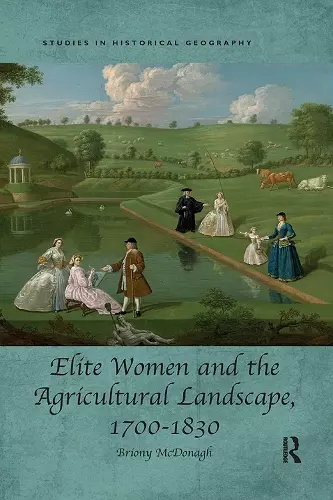Elite Women and the Agricultural Landscape, 1700–1830
Format:Paperback
Publisher:Taylor & Francis Ltd
Published:23rd Jan '19
Currently unavailable, our supplier has not provided us a restock date
This paperback is available in another edition too:
- Hardback£135.00(9781409456025)

Social and economic histories of the long eighteenth century have largely ignored women as a class of landowners and improvers. 1700 to 1830 was a period in which the landscape of large swathes of the English Midlands was reshaped – both materially and imaginatively – by parliamentary enclosure and a bundle of other new practices. Outside the Midlands too, local landscapes were remodelled in line with the improving ideals of the era. Yet while we know a great deal about the men who pushed forward schemes for enclosure and sponsored agricultural improvement, far less is known about the role played by female landowners and farmers and their contributions to landscape change.
Drawing on examples from across Georgian England, Elite Women and the Agricultural Landscape, 1700–1830 offers a detailed study of elite women’s relationships with landed property, specifically as they were mediated through the lens of their estate management and improvement. This highly original book provides an explicitly feminist historical geography of the eighteenth-century English rural landscape. It addresses important questions about propertied women’s role in English rural communities and in Georgian society more generally, whilst contributing to wider cultural debates about women’s place in the environmental, social and economic history of Britain. It will be of interest to those working in Historical and Cultural Geography, Social, Economic and Cultural History, Women’s Studies, Gender Studies and Landscape Studies.
"Briony McDonagh’s recent monograph, awarded the Joan Thirsk Memorial Prize, tracks the trials and tribulations of seventy elite female farmers in Georgian England. By illuminating wealthy women’s activities in owning, managing and improving landed property, McDonagh’s study provides an important corrective to a historiographical tradition in which male agrarian improvers have been depicted as authors of the rural landscape and female contributions largely effaced. Meticulously researched and closely written, this slim volume opens up new vistas by challenging analyses positing an increasingly gendered division between private and public spheres during the eighteenth century."
- Elly Robson, Jesus College, University of Cambridge
It is a book that leaves you wanting more; many of the different elements of the book would be worthy of a full- length study in themselves, especially the brief section on women landownership in literature. This, though, is its strength. It covers new ground and provides new questions to be considered, as the author notes herself in the conclusion. As one would hope from a historical geographer, McDonagh has provided an excellent, clear map. I believe it will guide future scholarship in this area for a number of years.
- Ruth Larsen, University of Derby
ISBN: 9780367208219
Dimensions: unknown
Weight: 453g
224 pages